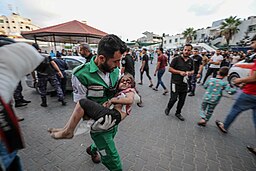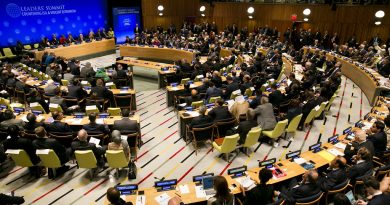Israel Resumes Bombardment of Gaza as Truce Collapses
Neve Walker
Staff Writer
Almost two months since the start of the conflict, the Israel-Palestine strife has continued to rise. The Israeli Defense Forces, IDF, has resumed the bombardment of Gaza after a ceasefire that lasted from November 24 through November 30, according to Al Jazeera.
Reuters writes that the ceasefire that was negotiated was to last at least four days, and would also include the release of 50 hostages held by Palestinian forces in exchange to around 150 Palestinians jailed in Israel. Throughout the truce 110 Israeli hostages, out of the original 240, were freed by Hamas, while 240 Palestinian prisoners were released by Israel, writes Al Jazeera. The majority were women and children on both sides.
Israeli National Security Adviser Tzachi Hanegbi released a statement by the prime minister’s office regarding the state of the captives.
“Negotiations for the release of our captives are progressing and continue all the time.”
Yet, despite the negotiations, the ceasefire did not last long. According to the Associated Press, tensions have continued to rise in December as Palestinians have been cut off from necessary supplies such as food and water. Israeli forces have been in Gaza to fight Hamas since October 27.
The Associated Press also reports that United Nations officials declared that there are no safe places anymore in Gaza since the ceasefire ended. Fighting in areas around the city of Khan Younis in southern Gaza has displaced tens of thousands of people while also cutting off Gaza from outside aid. It has been reported that more than 80 percent of Gaza’s population has fled their homes as of December 7.
United Nations Secretary General Antonio Guterres wrote a letter to Jose Javier de la Gasca Lopez Dominguez, the current president of the United Nations Security Council, evoking the Article 99 of the United Nations Charter, for the first time in his capacity as Secretary General on December 9. This follows 7 days since the ceasefire ended, resulting in the continued bombardment of Gaza by Israel. In this letter, Guterres urges the Security Council to take immediate action toward a ceasefire regarding the situation in Gaza, and the human rights violations taking place.
“Civilians throughout Gaza face grave danger,” Guterres wrote in the letter. “Since the start of Israel’s military operation, more than 15,000 people have reportedly been killed, over 40 per cent of whom were children.”
Evoking the 99th Article allows Guterres, as the UN secretary-general, to bring the Security Council’s attention to “any matter which in his opinion may threaten the maintenance of international peace and security,” as written in the UN Charter. The U.S. later vetoed a UN Security Council Resolution calling for the immediate implementation of a humanitarian ceasefire and the unconditional release of hostages, writes Reuters.
In this letter, Guterres is not only stating the facts of the case, but urges action that needs to take place to help the people of Gaza, urging not only in this letter but in speeches as well that nowhere is safe in Gaza with the continued attacks.
“The current conditions are making it impossible for meaningful humanitarian operations to be conducted,” wrote Guterres. “We are, nevertheless, preparing options for monitoring the implementation of the resolution, even if we recognize that in the present circumstances, that is untenable.”
Despite the pleas for peace by UN officials, Israel has continued its attack on Palestine. Al Jazeera reports in its live updates the introduction of other terrorist organizations into the conflict, specifically mentioning the group Hezbollah which has attacked from southern Lebanon, as well as Iranian-backed fighters in Syria that have launched attacks in northern Israel. According to the report, the Iranian-backed fighters launched 13 attacks and Hezbollah launched 10 attacks against Israeli forces.
Tensions continue to rise with the increased attacks from Israeli forces, as well as attacks from Hamas in Gaza, Hezbollah in Lebanon, Houthis in Yemen, and Iran-backed militias in Syria and Iraq. With the collapse of the humanitarian truce, a long-protracted conflict that may involve wider regional actors remains on the horizon.
Image courtesy of Wikimedia Commons


